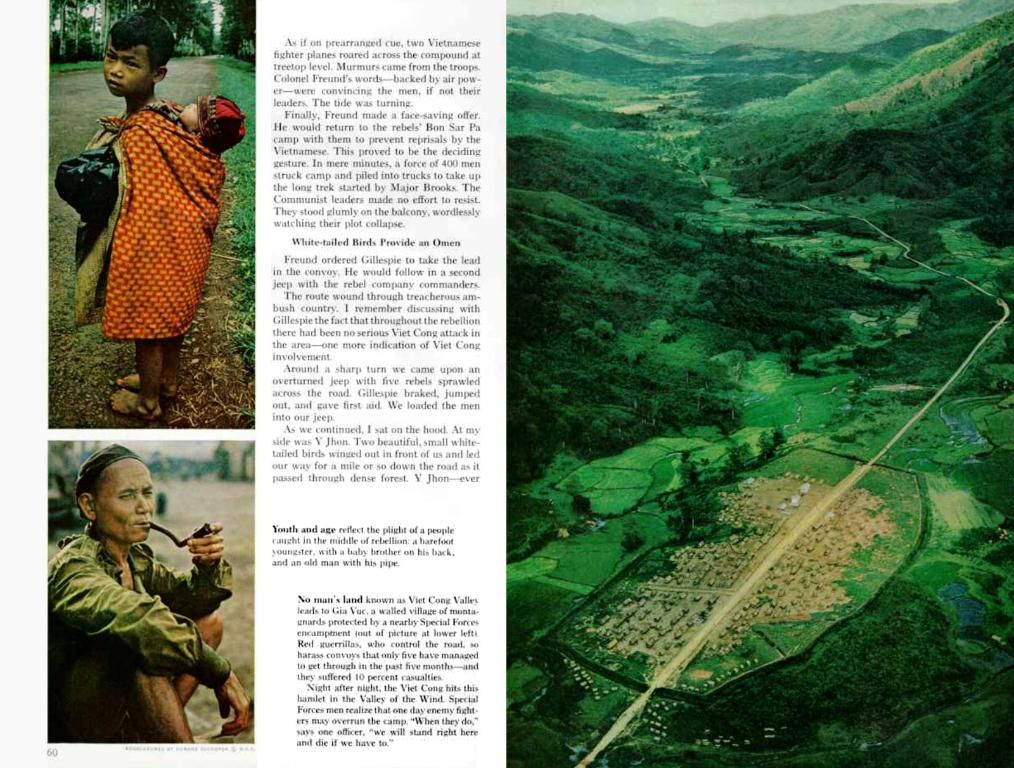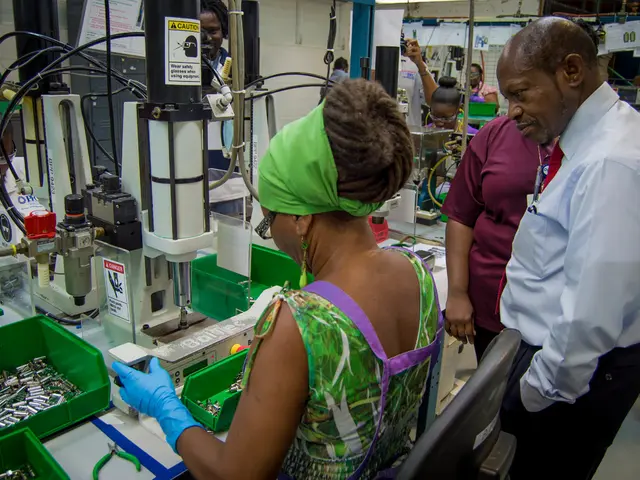Going Over the Edge: Mozambique's Disastrous Exploitation
In Mozambique, escalating violence, hunger, and a climate disaster leave destitution; funds diverted towards military and gas industries by Europe.
Saying It Like It Is, by You
Mozambique is the third most neglected crisis worldwide, beaten out only by Cameroon and Ethiopia. However, European corporations are pouring billions into liquid natural gas operations in the region. But for the locals, these investments offer little relief. Let's dive into why this country is drowning and not benefiting from its riches.
Mozambique gets a lot of love from travel magazines and guides, with its beautiful coastline, extensive sandy beaches, and vibrant reefs. But beneath the surface lies a hidden nightmare. This nation in East Africa faces multiple crises—about five million people are succumbing to hunger, as the world seems apathetic to the suffering.
The Norwegian Refugee Council (NRC) has stepped up to sound the alarm. Secretary-General Jan Egeland warns, during his recent visit to Mozambique, that the situation is reaching a critical tipping point. "The population is verging on the edge of a precipice, facing unimaginable suffering if the world continues to turn its back," warns Egeland.
Politics: Mozambique—A Hot Mess
Several issues plague the impoverished country, home to about 33 million people. In recent months, three devastating cyclones have lashed the northern coastal region, obliterating homes, roads, clinics, and schools. Around 1.4 million people are affected, according to the World Food Programme (WFP). With much of the agricultural land submerged, not only have people lost their homes but also their means of survival. Cyclones in the Indian Ocean have grown more intense and destructive due to global warming, leading to extreme weather events. During the dry season, scorching droughts frequently occur, causing the soil to dry up.
Bloodbath, Terror, and Exile
In the poorest region of the country, the province of Cabo Delgado in the far northeast, bordering Tanzania, a brutal conflict has been raging since 2017. The militant group Ansar al-Sunna, an affiliate of the global terrorist organization Islamic State, is wreaking havoc there. Locals regularly report beheadings, mutilations, and torture at the hands of radicalized fighters. Mozambique's stretched and under-resourced military is struggling to handle the militia alone and has sought assistance. Between 2019 and 2023, around 200 Russian mercenaries from the Wagner Group were stationed there, but they suffered heavy losses, with at least ten Wagner fighters beheaded. In 2023, Wagner pulled out.
Brief Tidbits
"Making Friends" Russia and Africa Strengthening Ties
Instead, an African peace mission was assembled. Eight member states from the Southern African Development Community (SADC) contributed a total of over 2,000 soldiers to fight the Islamists. In 2024, the SADC troops withdrew following a period of calm. However, the Rwandan army remains stationed there. Rwanda has negotiated a bilateral agreement with Mozambique and dispatched around 2,000 soldiers, considered among the best-trained forces in Africa, active in numerous UN peacekeeping missions on the continent.
Funded in part by the European Union with approximately 20 million euros, this mission is no coincidence. The contested province is rich in natural gas, boasting the third-largest reserves in Africa. French oil giant Total plans to invest a whopping 20 billion USD in a liquefied natural gas plant, although construction has been delayed several times due to security concerns, most recently to 2029. Numerous Rwandan companies have snagged contracts with Total for infrastructure and security.
The EU's funding for this mission has been criticized. Despite UN investigations revealing that Rwanda has clandestinely and unlawfully deployed thousands of soldiers to support rebels in neighboring Democratic Republic of Congo, the EU has once again approved military aid at the end of 2024. The Europeans appear grateful that they don't have to send their own troops to secure Total's investments, as liquefied natural gas plants are crucial for the transition to clean energy.
Meanwhile, humanitarian aid for the starving population is hard to come by. The UN's financial plan, aiming to provide support to the population and over 1.4 million displaced persons at a cost of around 400 million dollars, was only funded at roughly 40% in 2024. This year looks even grimmer, with over half of the funds provided by the US aid agency USAID, which was shut down under the Trump administration. The EU's aid agency ECHO has contributed a measly 8%—a fraction of the investment Total is willing to make. "I urge governments and the private sector to urgently mobilize resources," warns NRC director Egeland, lamenting: "While several governments and multinational corporations are exploiting Mozambique's natural resources, they offer minimal aid to the starving population."
In the midst of chaos, there are opportunities. European companies, alongside others, are extracting Mozambique's liquid natural gas resources—sowing a path to economic growth. However, the conflict and humanitarian crisis complicate operations in the region, and corporations must walk a delicate line between business interests and ethical considerations in conflict zones.
- The Commission, striving to address the situation, has also taken a number of steps to improve the environmental-science surrounding climate-change, particularly in relation to the industry of oil-and-gas.
- As part of the efforts for environmental-self-development and personal-growth, many people are increasingly investing in renewable energy sources, moving away from the oil-and-gas industry, due to concerns about war-and-conflicts and policy-and-legislation related to climate-change.
- Despite the ongoing chaos, some sectors of the business, like real-estate and wealth-management, are still booming, attracting foreign investors who see opportunities amidst the crises in Mozambique.
- As part of the general-news coverage, reports about crime-and-justice and accidents -- such as oil spills, corruption, and human rights violations -- are regularly published, shedding light on the complex and challenging environment in which corporations operate in Mozambique.
- As the education-and-self-development sector tries to address various crises the nation faces, a growing number of educated youth are speaking out against the exploitation of their homeland, demanding more transparency, accountability, and fair distribution of resources in policy-and-legislation.
- In response to the urgent need for action and increased pressure from various stakeholders, certain businesses, including those involved in the oil-and-gas industry, have pledged to improve their environmental, social, and governance practices (ESG), aligning themselves with international standards for wealth-management and ethical business conduct.
- Recognizing the importance of addressing short and long-term effects of climate-change, the finance sector is increasingly focusing on investing in projects that support the transition to clean energy, using various tools like green bonds and impact investing to direct capital toward positive change in the industry, environment, and society.
- Due to the ongoing war-and-conflicts and instability in some regions, migration patterns are shifting, with a growing number of people seeking refuge in neighboring countries and other parts of the world, leading to a greater emphasis on humanitarian aid and support services.
- As the governments around the world grapple with the challenges of climate-change, the political landscape is constantly evolving, with policies focusing on both mitigation and adaptation measures aimed at protecting the environment and ensuring a more sustainable and secure future for generations to come.
- In the face of the multiple crises Mozambique is facing, it is time for all stakeholders to work together, using their individual areas of expertise: businesses can employ their financial might and innovative abilities to drive positive change while governments can develop and enforce policies that promote fair distribution of resources, ethical practices, and climate-change resilience. With the cooperation of the international community, hope may yet be restored to this ravaged nation.








